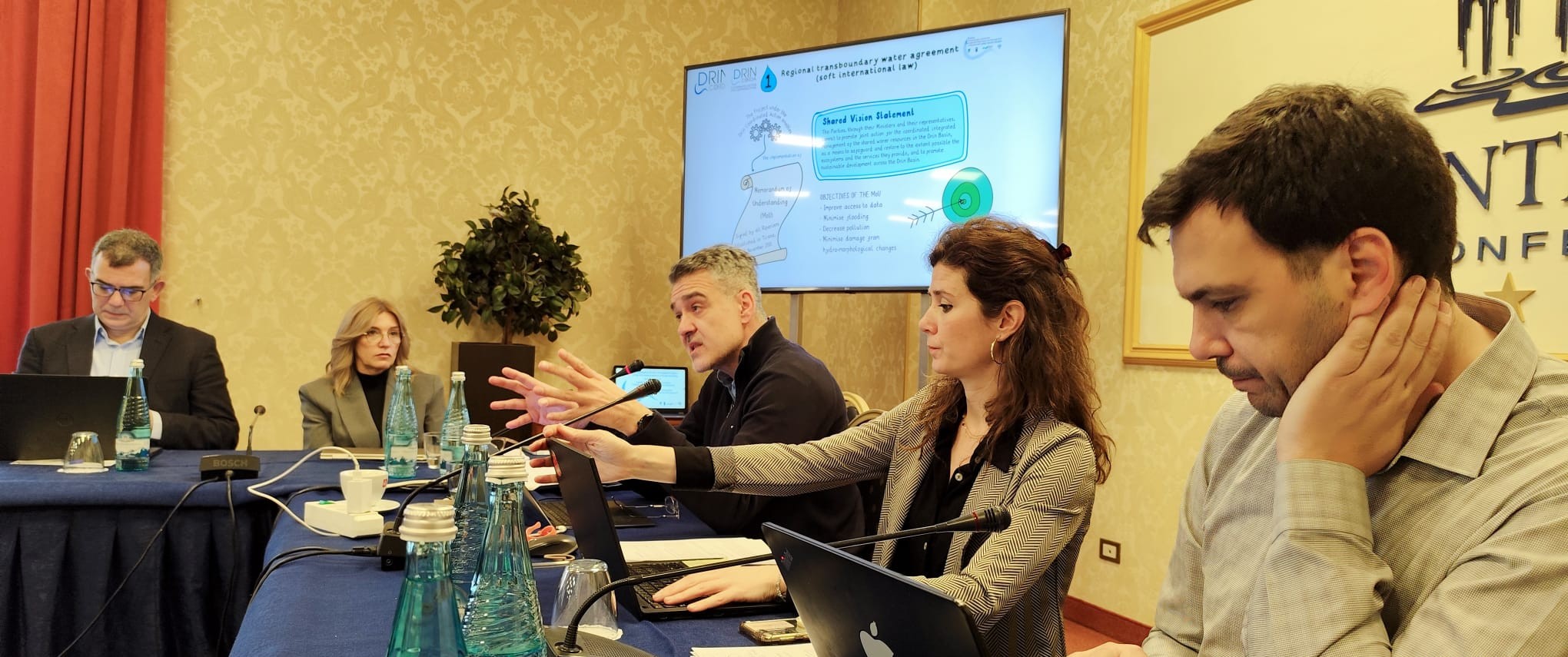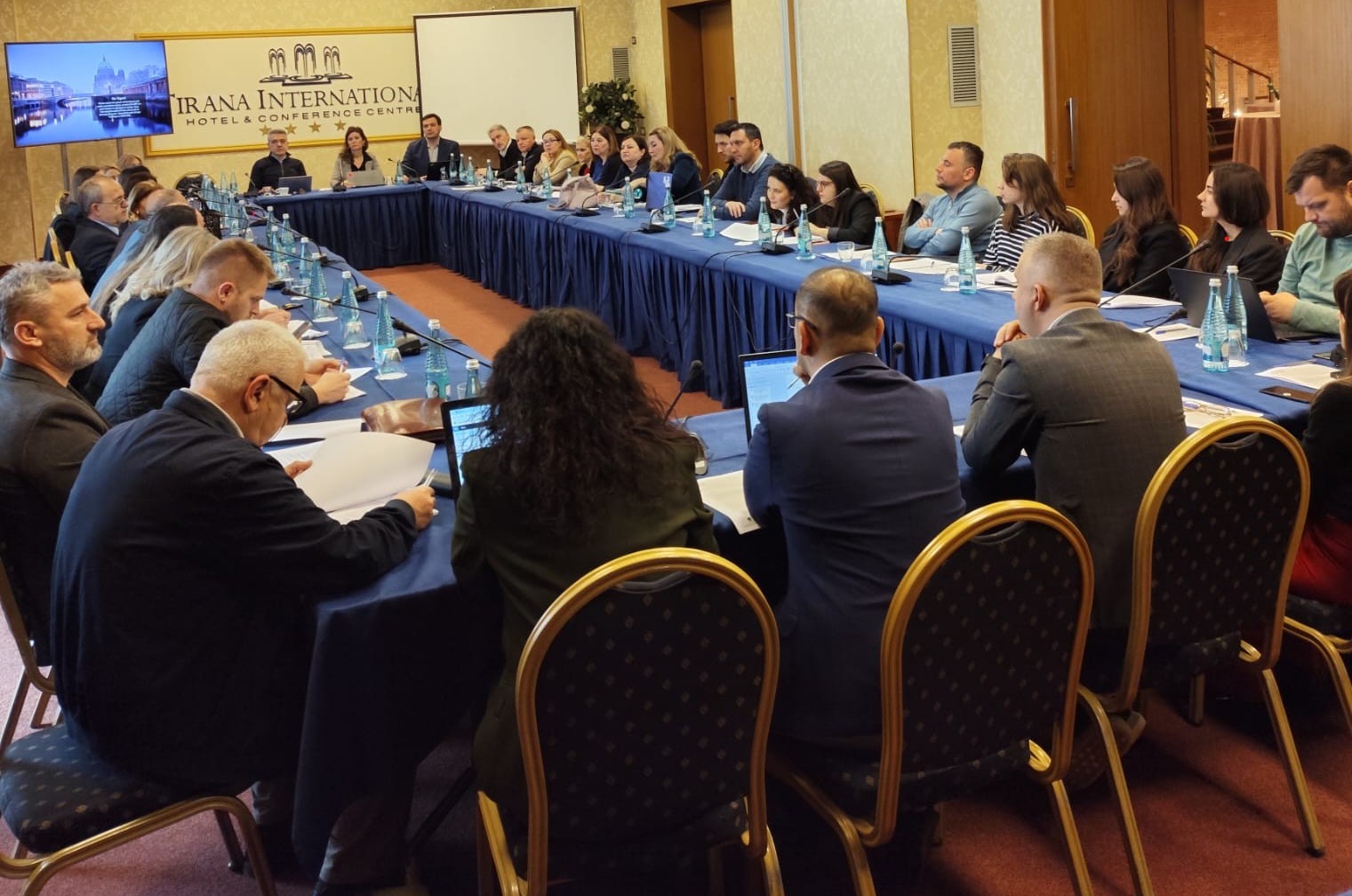The new GEF- funded project “Implementing the Strategic Action Programme (SAP) of the Drin Basin to Strengthen Transboundary Cooperation and Enable Integrated Natural Resources Management” constitutes a new chapter in the history of Coordinated Action for the Drin River Basin and transboundary cooperation in South-East Europe.
During the Inception meeting that took place in Tirana, 26-28 March 2025 high-level representatives from the Drin Riparians together with international agency representatives reaffirmed their commitment to work together for sustainable management, ecosystem preservation and climate resilience in the Drin River Basin. Bringing together, Albania, Kosovo*, Montenegro, and North Macedonia—collectively known as the Drin Riparians—this project sets a solid standard for sustainable transboundary action providing support to the implementation of the Drin Strategic Action Programme and its content endorsed by Riparians back in 2020.
Spanning a complex network of rivers, lakes, and aquifers—including the White Drin, Black Drin, Buna/Bojana Rivers, and the Prespa, Ohrid, and Skadar/Shkoder Lakes—the extended Drin Basin stretches across the western Balkans, touching parts of Greece and the Adriatic Sea. Home to over 1.61 million people across 1,450 settlements, it is a lifeline, fueling energy production, irrigation, tourism, and fisheries while harboring a biodiversity treasure trove. This vital resource faces mounting pressures: pollution, ecosystem degradation, flood risks, and competing demands across borders.

The GEF Drin II project, with its USD 7.1 million budget and five-year timeline, steps in to tackle these challenges, building on a legacy of cooperation that began nearly two decades ago.
During the Inception meeting in Tirana that marked the launching of the project, Deputy Minister of Tourism and Environment of Albania Sofjan Jaupaj emphasized: "Taking bold action on the Drini River will propel Albania forward in its EU accession journey, particularly in Chapter 27. As Albania accelerates toward EU integration, this project will significantly strengthen our efforts in the subchapters on nature and water resources. We face tough challenges—like protecting nature while developing infrastructure—but we must tackle them head-on to ensure sustainability and safeguard our environment.”
Ms. Kaltrina Zekolli Shaqiri, Deputy Minister of Transport of North Macedonia highlighted that “The government of North Macedonia will support the process of consolidation of the Drin Basin, transboundary institutional policy & legal frameworks, implementing the Drin SAP actions & ensuring the development of mechanisms for gender participation, coordination and monitoring progress.”
“For the Drin Riparians, this is more than an environmental project—it’s a socio-economic lifeline. By fostering regional cooperation, the SAP not only safeguards a shared ecosystem but also builds resilience against climate change, supports sustainable development, and strengthens ties among riparians with a complex history” said Francisco Roquette, UNDP Deputy Resident Representative who attended the event.
In line with the principles of the Water Convention, its holistic approach integrates critical issues like biodiversity, energy, and water security, aligning with the Drin Riparians’ aspirations for European Union integration. It’s a model of “source-to-sea” management, ensuring that actions upstream benefit communities downstream and protect the Adriatic’s marine environment.

The GEF Drin II project is structured around four key components, each designed to address the basin’s multifaceted challenges:
Boosting Capacity: By equipping institutions and stakeholders with technical tools and deeper ecological understanding, the project fosters climate-resilient resource management at every level—regional, national, and local.
Consolidating Frameworks: Strengthened institutional arrangements and new policy instruments will pave the way for seamless cooperation across borders and sectors.
Addressing Transboundary Issues: From pollution to habitat loss, the project targets the root causes of environmental stress, accelerating SAP implementation.
Ensuring Participation and Sustainability: Inclusive mechanisms—emphasizing stakeholder engagement, gender mainstreaming, and robust monitoring—guarantee the project’s long-term impact. Coordinated action was absent until the development of the shared vision by the Riparians and the signing in November 2011 in Tirana, whereby they committed to sustainable management of the Drin Basin. This agreement established an institutional structure comprised of joint bodies such as the Drin Core Group and Expert Working Groups, with the Global Water Partnership-Mediterranean serving as the Secretariat.
The UNECE secretariat of the Convention on the Protection and Use of Transboundary Watercourses and International Lakes (Water Convention) supported the process of cooperation the extended Drin basin since its beginning.
“The project should allow establishing key elements for the long-term sustainability of the Drin cooperation, in particular an operational arrangement and a joint institution for cooperation. These components are crucial to ensure sustainable access to water resources needed to drive development in the region and resilience to climate change” underlined Francesca Bernardini, Chief of the Transboundary Section of the United Economic Commission for Europe (UNECE)
According to Dimitris Faloutsos, Deputy Regional Coordinator GWP-Med: "Albania, Greece, Kosovo, Montenegro, and North Macedonia continue their coordinated action for the management of the Drin Basin and the natural resources in the source to sea continuum from Lake Prespa to the Adriatic Sea, under the political process guided by the Drin MoU. GEF support, which started in 2015, will be extended in a new phase until the end of 2029, helping to address priorities and support the negotiation of a new joint institutional arrangement, building on achievements to date and scaled up to meet the challenges ahead. We are committed to providing support as needed."
The project is funded by GEF and is implemented by UNDP in the four project beneficiary areas in partnership with relevant line ministries, Global Water Partnership-Mediterranean and UNECE.
*This designation is without prejudice to positions on status, and is in line with UNSCR 1244/1999 and the ICJ Opinion on the Kosovo declaration of independence.
